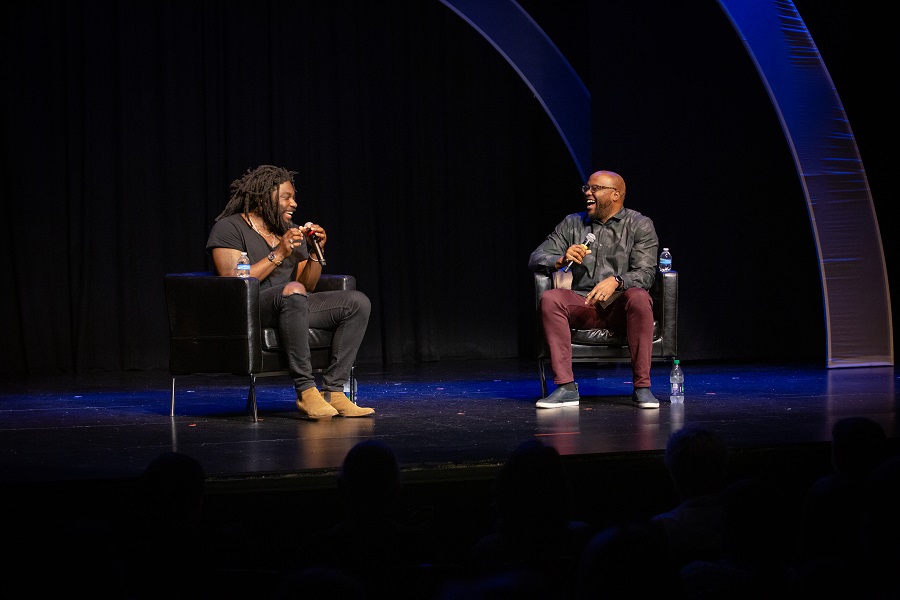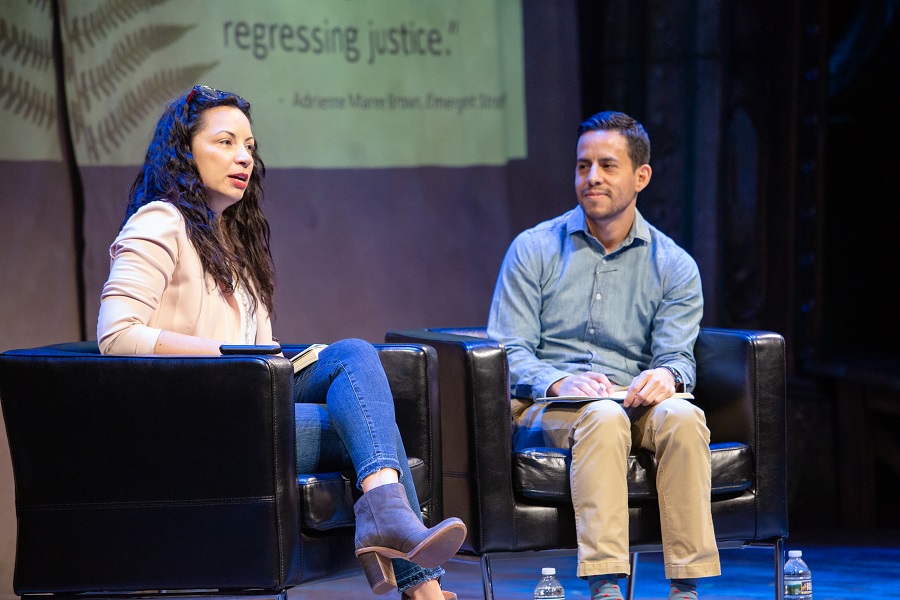There were performances depicting police brutality, neighborhood violence, the fear of growing older, and the ways in which friendships change over time. There were keynote addresses given by best-selling authors, an international leader in devised theatre, and two of the most high-profile new artistic directors in the country. There were conversations about identity, new-play development models, and how to move forward as a more inclusive, more innovative field. No, I didn’t hop in a time machine and get a sneak peek at Theatre Communications Group’s National Conference. I’m talking about the Theatre for Young Audiences/USA Biennial Festival & Conference held in Atlanta this past month.
If you’re surprised that the above description is talking about a children’s theatre conference, you shouldn’t be. Theatre for Young Audiences (TYA) has been tackling tough issues, experimenting with form, and pursuing artistic excellence for years. Building on this work, the convening served as a dynamic platform for members of the TYA community to connect, share ideas, and learn from one another. More than that, though, the gathering demonstrated that TYA is an exciting, relevant field that is making unique and valuable contributions to U.S. theatre.
Previously known as One Theatre World, the TYA/USA Festival & Conference is the biannual gathering of the national membership organization TYA/USA. This year’s conference took place from May 7 to 11 at the Alliance Theatre, with the theme “Breaking Down Walls.” The theme was partly inspired by the Alliance’s recent renovation of its Coca-Cola Stage. “In tearing down their separate balcony in their mainstage venue—an architectural reminder of the Jim Crow-era South—the Alliance embodies their commitment to diversity and inclusivity through their physical space,” said TYA/USA executive director Jonathan Shmidt Chapman in his welcome note. More than 350 TYA professionals from across the country attended, with the theatre’s new, inclusive design serving as a backdrop for conversations about tearing down barriers in the field, as well as those facing our nation and the world.
The conference began with a conversation between best-selling YA novelist Jason Reynolds and playwright Idris Goodwin, producing artistic director of StageOne Family Theatre in Louisville, Ky. Goodwin was commissioned by Nashville Children’s Theatre and Metro Theater Company of St. Louis to adapt Reynolds’s novel Ghost, which premiered at Nashville Children’s Theatre this past January. Goodwin described Reynolds as “one of the people that I always feel excited to be making art in the same moment as,” and joked that while adapting a book for the stage “is kind of like putting a Rubik’s Cube together, but with your hands covered in Vaseline,” adapting Reynolds’s work was “like getting to jam with another musician.”

Reynolds discussed the role that the arts have played in his family and childhood in Washington, D.C., and how rap music helped to shape his voice as a writer. “Rap music is poetry, whether you like it or not,” he said. “We can’t celebrate Bob Dylan as a poet and not celebrate Nas as a poet.” Reynolds also stressed the importance of using kids as a sounding board when creating art for young readers or audiences. “[Young people] know when you don’t care, they know when you’re being condescending,” he said. “They’re fully aware, and they find it disrespectful. If you ask a young person, ‘Does it ring true?’ I think they’ll tell you the truth.”
Reynolds’s work was a major through-line of the conference, as three of the 11 performances scheduled during the week were adaptations of his novels. All American Boys, presented by Brooklyn’s Off the Page as a staged reading, tells the story of an unarmed Black boy who is beaten by a police officer and the white boy who witnesses the attack. Goodwin’s adaptation of Ghost, re-mounted by Nashville Children’s Theatre, is about a troubled kid who finds solace and self-confidence through running track. Long Way Down, produced by the Kennedy Center, is a solo piece that takes place during an elevator ride, where 15-year-old Will must decide whether or not to search for his brother’s killer. All of these pieces look at tough issues through a kid’s perspective, and balance hard truths with warmth and humor.
While the adaptations of Reynolds’s work were mostly geared toward audiences aged 10 and up, work for younger audiences had a strong presence at the conference as well. Dave Brown, founder of the collaborative platform ThePaperBoats, gave a keynote speech about his experience devising work for young audiences, which includes a 20-year run as artistic director of Australia’s Patch Theatre. “I love that children have no preconceptions of what theatre should be, because it makes them very open to the possibilities of what theatre can be,” he said.
Brown also outlined his work with ThePaperBoats, which he calls “an international partnership platform for theatremakers and producers who are interested in pioneering new ways of connecting and creating around the process of devising poetic, image-based theatre for early-childhood audiences.” Using seven creative principles as a guide, Brown and his collaborators in Adelaide, Australia, developed the theatre piece Especially on Birthdays, a visual poem for the very young that began with the animating idea of “exploring ‘two-ness’ in every which way.” Brown meticulously documented the process and shared his records with Megan Alrutz, head of the Drama and Theatre for Youth and Communities program at the University of Texas at Austin. Alrutz then used the same creative principles to create a separate theatre piece, Gimme Please!, which also explores the concept of “two-ness.”
Both works, connected thematically but very different in terms of tone and story, were performed at the conference. Especially on Birthdays depicts the relationship between a pair of five-year-old twins, and shows what happens when one refuses to turn 6. The mostly non-verbal Gimme Please! follows two friends as they meet, play, fight, and grow close. The two pieces are playful, interactive, and visually striking, and both explore existential issues relating to time, aging, friendship, and conflict. And boy, were the kids into it.

The theme of “Breaking Down Walls” was present in the conference’s smaller panels and conversations as well. Breakout sessions focused on creating bilingual work, serving young people with autism, training teaching artists to be trauma-informed, supporting parents who work in TYA, and creating more leadership opportunities for students and early-career professionals in the field. Sessions also focused on adaptation, co-production, theatre for the very young, and immersive work.
Other speakers broke down distinctions between TYA and “grown-up” theatre by speaking to issues that are relevant throughout the theatre world. Stephanie Ybarra and Jacob G. Padrón, new artistic directors of Baltimore Center Stage and New Haven, Conn.’s Long Wharf Theatre, respectively, spoke about their work with the Artists’ Anti-Racism Coalition. The group, which Ybarra and Padrón co-founded with Roberta Pereira and David Roberts, has facilitated conversations and led trainings about undoing racism and making more space in the field for people of color, working specifically with artistic directors, funders, artists, critics, and other leaders in the theatre world. “We’re not sitting on the boards of Off-Broadway theatres, so we can’t hire and fire leadership, but we can appeal to leadership who make the hiring decisions, who make the casting decisions,” said Ybarra.
Ybarra and Padrón also presented data that the Coalition had collected, highlighting how playwrights and directors of color still aren’t getting anywhere near the same number of opportunities as white artists at large Off-Broadway theatres. According to Ybarra and Padrón, the data has spurred many of the theatres in question to actively make changes in the way they think about season planning. The two also noted that anti-racist work is a continual process, as opposed to a means toward an achievable goal. “The four of us, we talk about how we’re not ever gonna be woke,” said Padron. “The work is a lifelong journey—you are always learning.”
The final keynote was given by playwright and best-selling author Pearl Cleage, who gave a poetic reflection on her coming of age during the Civil Rights movement, her desire for multiple generations of activists to work together, and her belief in the power of theatre. “It is my feeling that what we do as artists, and as theatre artists specifically, has never been more critical to the survival of our nation, and our world,” she said. She also gestured toward the importance of TYA by emphasizing that we must all work to build a better world for future generations. “What if the care and raising of healthy, happy, peaceful, literate babies was at the center of every public policy decision, not just here, but all over the world?” she asked. “Everything would change at every level, wouldn’t it? It would have to!”
The TYA/USA Festival & Conference inspired attendees to break down walls on multiple fronts, but perhaps the biggest wall the conference was able to tear down was the one between childhood and adulthood; proving that TYA can spark both child-like wonder and mature conversation, often in the same theatre piece, and that making theatre for children is one of the most sophisticated, serious jobs there is.
Emma Halpern is the co-artistic director of New York City Children’s Theater.


